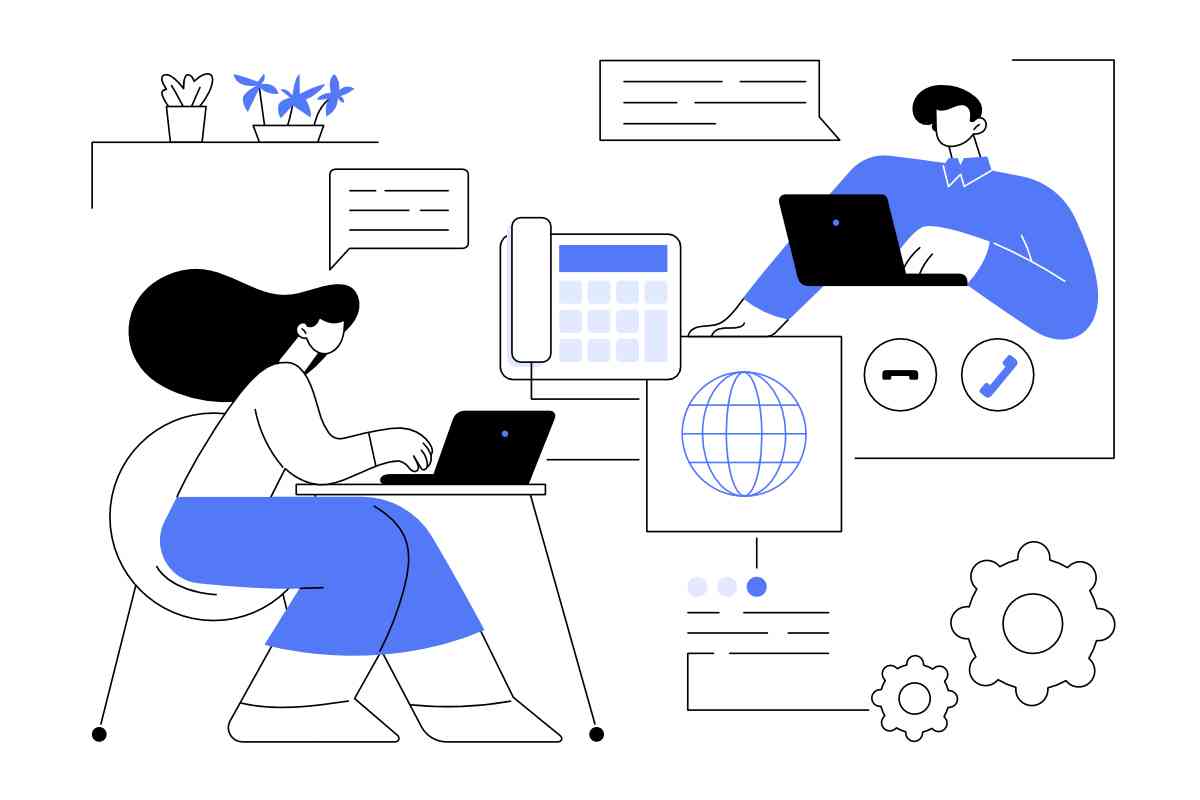Choosing the right communication platform is critical for businesses of all sizes. Whether you’re a start-up looking for an affordable solution or an established company seeking advanced features, selecting the right phone system can boost your productivity and customer satisfaction. In this analysis, we’ll compare Nextiva vs Google Voice, two prominent VoIP solutions, examining their features, pricing, and which is better suited for UK businesses.
Overview of Nextiva vs Google Voice
Nextiva is a cloud-based communication platform designed for businesses, offering a range of tools including VoIP, video conferencing, CRM, and team collaboration. It’s tailored for companies that need a comprehensive, scalable communication system.
Google Voice is part of Google’s suite of tools, providing basic VoIP features aimed at smaller businesses and individual users. With its easy integration with Google Workspace, it’s often favoured by companies already using Google products. However, its features are less comprehensive compared to Nextiva.
| Feature | Nextiva | Google Voice |
|---|---|---|
| VoIP functionality | Advanced call routing, auto-attendants, call queues, call recording, voicemail transcription, toll-free numbers | Basic VoIP features like call forwarding, voicemail, voicemail transcription, and call blocking |
| Collaboration tools | NextivaONE platform for messaging, video conferencing, and file sharing | No dedicated collaboration tools outside of Google Workspace |
| Third-party integration | Integrates with Microsoft Teams, Outlook, Salesforce, and more | Seamless integration with Google Workspace (Gmail, Google Calendar, Google Meet), but fewer third-party apps |
| Mobile app | Full-featured mobile app with access to VoIP, CRM, and collaboration tools | Mobile app with basic calling and voicemail features, but lacks advanced functions |
| Call quality and reliability | High call quality with multiple data centres for maximum uptime | Call quality may vary depending on internet connection |
| Customer support | 24/7 customer support via phone, email, live chat, plus online help centre | Limited support via online forums and knowledge base, no direct live support for most plans |
| Pricing | Essential Plan: £18/user/month Professional Plan: £23/user/month Enterprise Plan: £33/user/month | Personal Plan: Free (for individual users) Starter: £8/user/month Standard: £14/user/month Premier: £22/user/month |
| Free plan available | No | Yes (Personal Plan for individual use) |
| Advanced features | Call queues, auto-attendants, CRM integration, advanced analytics, voice recording | Limited features—multi-level auto-attendant and ring groups available only on higher-tier plans |
| Best for | Medium to large businesses with complex communication needs and scalability | Small businesses and start-ups using Google Workspace with basic communication needs |
| Scalability | Highly scalable with advanced tools for growing businesses | Limited scalability, more suited for small teams or individual users |
| Voicemail transcription | Yes (included in all plans) | Yes (included in all plans) |
| Call recording | Available in higher-tier plans | Not available |
| Toll-free numbers | Available | Not available |
| Global call availability | Yes (Enterprise plan) | Yes (Premier plan) |
| Video conferencing | Yes (via NextivaONE) | Limited to Google Meet integration |
| CRM integration | Yes (integrates with major CRMs like Salesforce) | No direct CRM integration |
| Multi-level auto-attendant | Available (higher-tier plans) | Available (Standard plan and above) |
| Ring groups | Yes | Available (Standard plan and above) |
Key features comparison
When comparing Nextiva vs Google Voice, it’s important to consider the range and depth of features that each platform provides. Here’s a breakdown of the most critical elements for businesses:
1. VoIP and call management
- Nextiva: Offers extensive VoIP functionality, including advanced call routing, auto-attendants, call queues, call recording, and voicemail transcription. These features are ideal for businesses that need to manage large call volumes or have multiple departments. Nextiva also offers toll-free numbers, making it easier for customers to reach your business.
- Google Voice: Provides basic VoIP capabilities such as call forwarding, voicemail, and the ability to screen calls. Voicemail transcription and call blocking are included, but Google Voice lacks advanced features like call queues and auto-attendants, limiting its usefulness for businesses with more complex call management needs.
2. Collaboration and integration
- Nextiva: Includes NextivaONE, a platform that allows teams to collaborate via messaging, video, and file sharing. It integrates well with third-party applications such as Microsoft Teams, Outlook, and Salesforce, making it suitable for businesses that need unified communication tools across different platforms.
- Google Voice: Integrates seamlessly with Google Workspace tools such as Gmail, Google Meet, and Google Calendar. While these integrations are useful for businesses already relying on Google services, Google Voice doesn’t support as many third-party applications as Nextiva does, which may be a drawback for companies that use other software solutions.
3. Mobile app functionality
- Nextiva: Offers a fully featured mobile app, allowing employees to make and receive calls, access voicemails, and collaborate with colleagues from anywhere. The app mirrors the desktop experience, providing a consistent user experience across devices.
- Google Voice: Also offers a mobile app that allows for making and receiving calls, managing contacts, and accessing voicemail. However, it lacks the more advanced mobile capabilities that Nextiva’s app provides, such as CRM access and team collaboration features.
4. Call quality and reliability
- Nextiva: Known for its high call quality and reliability, Nextiva operates on a private cloud and uses multiple data centres to ensure uptime. This makes it a reliable choice for businesses that depend heavily on their phone systems.
- Google Voice: Call quality with Google Voice can vary, especially if your internet connection is unstable. Since Google Voice uses Google’s general cloud infrastructure rather than a dedicated VoIP system, businesses with higher call volumes or more demanding needs might experience occasional issues with call quality or dropped calls.
5. Customer support
- Nextiva: Provides 24/7 customer support via phone, email, and live chat, with highly responsive and knowledgeable agents. Nextiva also offers a comprehensive online help centre with guides and tutorials, making it easier for businesses to troubleshoot on their own.
- Google Voice: Support is limited to online forums and a knowledge base, with no direct live support available for most Google Voice plans. Businesses that require more hands-on assistance may find Google Voice lacking in this area, especially if they encounter technical issues.
Nextiva vs Google Voice pricing comparison
Pricing is always a crucial factor for businesses when deciding on communication tools. Here’s how Nextiva and Google Voice stack up in terms of costs.
Nextiva pricing (per user, per month):
- Essential: £18 – Includes unlimited voice and video calling, call analytics, and integrations with Google Workspace and Outlook.
- Professional: £23 – Adds unlimited conference calls, team collaboration tools, and CRM integration.
- Enterprise: £33 – Offers advanced analytics, voice recording, and access to the NextivaONE collaboration platform.
Nextiva’s tiered pricing allows businesses to scale up as they grow, offering more advanced features as you move up the plans. The pricing also makes it suitable for both SMEs and large enterprises.
Google Voice pricing (per user, per month):
- Free (Personal Plan): Includes basic call forwarding and voicemail but is limited to individual users.
- Starter: £8 – Offers free calling to US numbers, voicemail transcription, and integration with Google Workspace.
- Standard: £14 – Adds multi-level auto-attendant, desk phone support, and ring groups.
- Premier: £22 – Includes unlimited calling in the US, global locations, and advanced reporting.
Google Voice’s pricing is more affordable than Nextiva’s, especially for businesses that don’t need advanced features. However, the limitations of its lower-tier plans make it less appealing to businesses with complex communication needs.
Pros and cons of Nextiva vs Google Voice
Nextiva
Pros:
- Comprehensive call management features.
- Strong integration with third-party software.
- High call quality and reliability.
- 24/7 customer support.
- Scalable pricing suitable for businesses of all sizes.
Cons:
- Higher cost compared to Google Voice.
- Some features may be unnecessary for smaller businesses.
Google Voice
Pros:
- Affordable pricing, especially for small businesses and start-ups.
- Seamless integration with Google Workspace.
- Easy to use and set up.
Cons:
- Limited call management features.
- Less reliable call quality.
- Limited customer support options.
- Fewer integration options outside Google products.
Which should you choose?
The choice between Nextiva vs Google Voice ultimately depends on your business’s size, needs, and budget.
- Choose Nextiva if you’re a mid-sized or larger business that requires advanced features like call queues, CRM integration, and robust customer support. Nextiva is a great option for companies that expect to scale up their operations and need a comprehensive communication solution that can grow with them.
- Choose Google Voice if you’re a small business or a start-up with basic communication needs. Google Voice is affordable and integrates well with Google Workspace, making it ideal for companies that already use Google’s ecosystem and don’t require advanced call handling features.
Conclusion – Nextiva vs Google Voice
Nextiva and Google Voice offer distinct advantages for different types of businesses.
For smaller companies on a tight budget or those already using Google Workspace, Google Voice provides a simple, low-cost option.
However, if your business needs a more feature-rich, scalable solution with superior support, Nextiva is likely the better choice. By carefully assessing your communication needs and budget, you can choose the VoIP provider that’s best suited to your business’s growth and success.
FAQ
Nextiva offers more advanced call management features like auto-attendants, call queues, and call recording, making it ideal for larger businesses. Google Voice, while functional, provides more basic call management suitable for smaller businesses or those with simpler communication needs.
Nextiva integrates with a wider range of third-party software, including CRM systems like Salesforce and Microsoft Teams. Google Voice integrates seamlessly with Google Workspace tools, but its integration options beyond that ecosystem are limited compared to Nextiva.
Google Voice is generally more affordable, especially for smaller businesses. Its entry-level plans are much cheaper than Nextiva’s, but it lacks the advanced features Nextiva offers, making Nextiva better value for businesses with more complex communication needs.
Nextiva is designed to support businesses as they grow, offering scalable features like CRM integration, advanced analytics, and enterprise-level call management. Google Voice, while suitable for small businesses, offers fewer scalable features and may struggle to meet the needs of growing companies.
Nextiva offers toll-free numbers in its plans, making it a good choice for businesses that want to provide a free call option for customers. Google Voice, on the other hand, does not offer toll-free numbers, which may limit its appeal for customer service-based businesses.
Nextiva provides 24/7 customer support via phone, email, and live chat, with a robust help centre for troubleshooting. Google Voice offers limited support, primarily through online forums and a knowledge base, with no live support available for most of its plans.
Nextiva’s mobile app offers comprehensive remote functionality, including access to VoIP, collaboration tools, and CRM integration. Google Voice’s app provides basic calling and voicemail features, but lacks the advanced remote collaboration tools that Nextiva offers, making Nextiva a better option for remote teams.
Nextiva is known for its high call quality, using multiple data centres to ensure reliable service. Google Voice’s call quality can vary depending on the internet connection and may not be as stable, especially for businesses with higher call volumes.
Google Voice offers a free personal plan with basic VoIP features for individual users. Nextiva does not offer a free plan, but its tiered pricing structure provides advanced features that are better suited for business use, especially for those needing more robust communication tools.
Nextiva is better suited for medium to large UK businesses due to its comprehensive features and scalability. Google Voice is ideal for small businesses or start-ups that use Google Workspace and don’t require advanced features like call queues or CRM integration.

